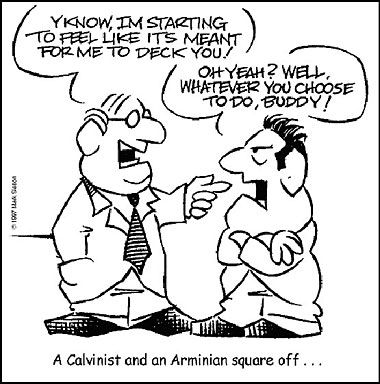How does meticulous providence work?
Posted: Tue Aug 20, 2013 5:40 pm
Calvinists often talk about meticulous providence, which seems to mean that God decreed/foreordained all things before the foundations of the world.
When I read about compatibilism, I read a lot about Edwards and his popular theory that every choice we make is in accordance with our greatest desire and since God controls our nature and desires, he determines the outcomes of our choices.
I understand this (although I disagree with the part about God controlling our nature and desires), but what do compatibilists say about those things that don't appear to involve choosing? How does God ensure that they come about?
For Example...
Q1 When I turn and see a ball coming toward my face, I throw up my hands. Did I unconsciously make a rapid choice to raise my hands? (I'm not opposed to this being a decision made in accordance with my greatest desire. I know the mind can process information in amazing ways and I know I have a great desire not to get hit by a ball in the nose!)
A1 I suspect Calvinists would say this was an unconscious choice made in accordance with my greatest desire.
Q2 When a doctor taps below my knee and I kick, did my brain unconsciously make a rapid choice or would Calvinists say that reflexes operate in a purely physical realm that doesn't involve mental processing?
A2 I suspect Calvinists would say this was nothing more than a reflexive action that involved no mental processing. But God ensured that it came to pass by controlling the doctor's prior decision to tap my leg.
Q3 When I smell pizza, I immediately think, I want pizza! Did I choose to think this thought? (How did God ensure I would think this exact thought?)
A3 I suspect Calvinists would say that my thought was not a choice but God ensured that I would think that thought by creating me with a strong desire for pizza & controlling my prior choice to leave my home and walk around the block (because he decreed that my neighbor would choose to buy Pizza--since that was his greatest God-given desire.)
Are there any Calvinists (or people knowledgeable about Calvinism) who can let me know if I'm correctly understanding meticulous providence from a compatibilist POV? I guess this is a question about "means" and "ends."
When I read about compatibilism, I read a lot about Edwards and his popular theory that every choice we make is in accordance with our greatest desire and since God controls our nature and desires, he determines the outcomes of our choices.
I understand this (although I disagree with the part about God controlling our nature and desires), but what do compatibilists say about those things that don't appear to involve choosing? How does God ensure that they come about?
For Example...
Q1 When I turn and see a ball coming toward my face, I throw up my hands. Did I unconsciously make a rapid choice to raise my hands? (I'm not opposed to this being a decision made in accordance with my greatest desire. I know the mind can process information in amazing ways and I know I have a great desire not to get hit by a ball in the nose!)
A1 I suspect Calvinists would say this was an unconscious choice made in accordance with my greatest desire.
Q2 When a doctor taps below my knee and I kick, did my brain unconsciously make a rapid choice or would Calvinists say that reflexes operate in a purely physical realm that doesn't involve mental processing?
A2 I suspect Calvinists would say this was nothing more than a reflexive action that involved no mental processing. But God ensured that it came to pass by controlling the doctor's prior decision to tap my leg.
Q3 When I smell pizza, I immediately think, I want pizza! Did I choose to think this thought? (How did God ensure I would think this exact thought?)
A3 I suspect Calvinists would say that my thought was not a choice but God ensured that I would think that thought by creating me with a strong desire for pizza & controlling my prior choice to leave my home and walk around the block (because he decreed that my neighbor would choose to buy Pizza--since that was his greatest God-given desire.)
Are there any Calvinists (or people knowledgeable about Calvinism) who can let me know if I'm correctly understanding meticulous providence from a compatibilist POV? I guess this is a question about "means" and "ends."
